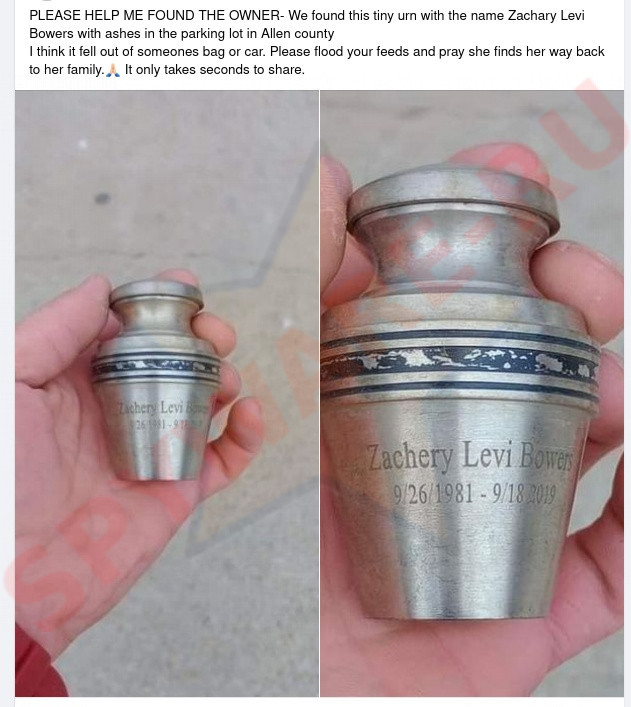The Zachary Levi Bowers Ashes Post Scam is a type of emotional manipulation scam circulating on Facebook. This scam exploits the natural empathetic reactions of users to spread quickly across the platform. The scammers create posts claiming to have found an urn with ashes labeled as belonging to Zachary Levi Bowers, placed in various locations such as a parking lot in Allen County, Buckinghamshire, or Walnut Creek.

These posts ask for urgent sharing, suggesting that the urn was accidentally lost and needs to be returned to the family. We’ve documented multiple instances of the Zachary Levi Bowers ashes scam. Examples of ‘Zachary Levi Bowers Ashes Post’ Facebook post:
PLEASE HELP ME FOUND THE OWNER- We found this tiny urn with the name Zachary Levi Bowers with ashes in the parking lot in Walnut Creek
I think it fell out of someones bag or car. Please flood your feeds and pray she finds her way back to her family.🙏🏻 It only takes seconds to share.
PLEASE HELP ME FOUND THE OWNER- We found this tiny urn with the name Zachary Levi Bowers with ashes in the parking lot in #buckinghamshire
I think it fell out of someones bag or car. Please flood your feeds and pray she finds her way back to her family.🙏🏻 It only takes seconds to share.
The choice of locations in the posts appears strategic, aimed to resonate emotionally with people in those communities. Those who are empathetic or have recently experienced loss may be more inclined to believe and share these posts. This scam is unlikely to target individuals who are familiar with common online scams, focusing instead on those moved by the story.
Due to the emotional nature of the posts, individuals may quickly share them in hopes of helping, without verifying their authenticity.
The primary goal of these scammers is to harness the viral nature of social media. By creating emotionally charged posts, they can manipulate people into sharing widely, which may lead to increased exposure and engagement with other malicious content or scams. They exploit the rapid dissemination of information on platforms like Facebook to amplify their reach and potentially engage in further fraudulent activities.
The scope of these scams is broad, affecting not only users in the US but also in the UK, Canada, and Australia.
How to Avoid Falling Victim to the Zachary Levi Bowers Ashes Post Scam on Facebook
🕵️ Verify the Urgency and Details
Scams often create a sense of urgency to provoke quick action without thought. Take a moment to assess the details of the post. Are they trying to rush you into sharing or clicking a link?
🔍 Conduct a Quick Search
Before sharing any posts or providing any information, search online for any credible reports or news about the supposed incident. Legitimate stories will likely be covered by local news or recognized community groups.
👀 Examine the Post’s Source
Check the authenticity of the account posting the story. Often, scam posts come from newly created profiles or pages that lack a history of genuine interaction.
❤️ Be Skeptical of Emotional Appeals
Emotional manipulation is a common tactic in these scams. If a post is playing heavily on emotions, it’s a red flag. Authentic requests for help will usually be accompanied by verifiable details and contact information.
🛡️ Protect Your Personal Information
Never provide your personal information, such as phone numbers, addresses, or financial details, in response to such posts. Legitimate organizations do not ask for sensitive information through insecure platforms like Facebook.
🔗 Consult Official Channels
If you think there might be a chance the post is legitimate, verify through official channels. For items like lost and found, contact local authorities or community centers directly rather than responding to the post.
🚫 Use Facebook’s Reporting Tools
Report suspicious posts to Facebook. Reporting helps reduce the spread of potential scams and supports the platform in taking action against fraudulent activities.
📚 Stay Informed About Scam Tactics
Educate yourself and others about the signs of scams and the best practices for online safety. Awareness is a powerful tool against fraud.




